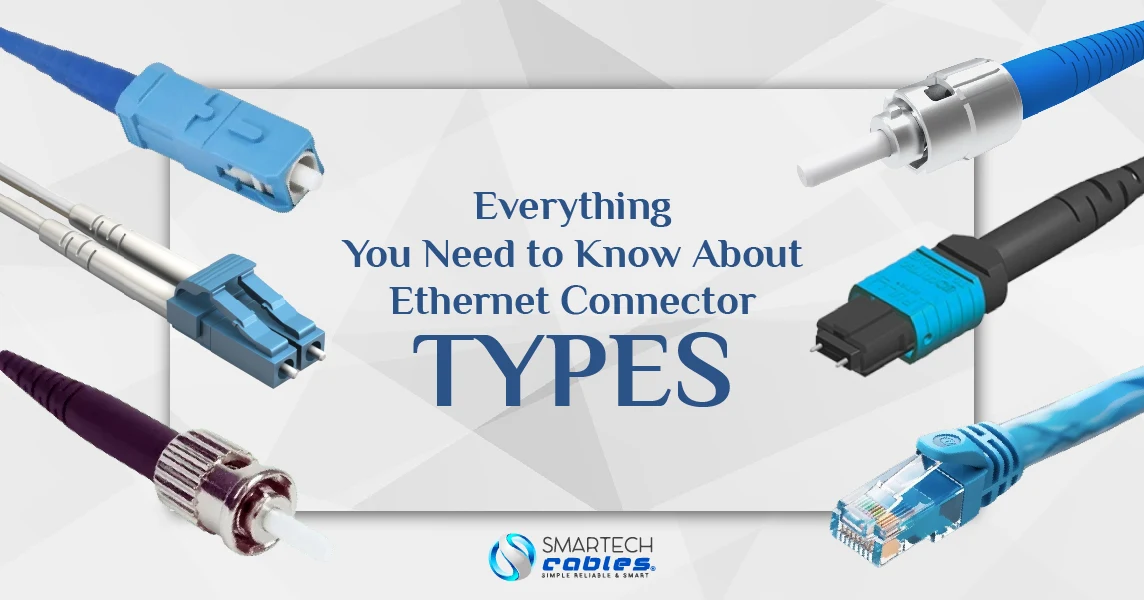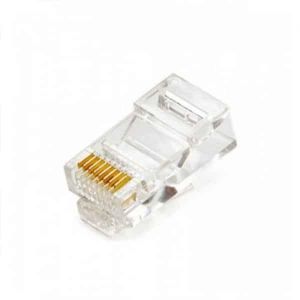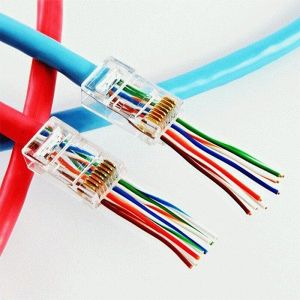All Essential Ethernet Connector Types in Networking
All Essential Ethernet Connector Types in Networking

In today's interconnected world, Ethernet connectors serve as critical linking devices to routers, switches, and beyond. Most people recognise cable connectors with the standard RJ45 connector, but the world of Ethernet cable connectors extends far beyond this familiar option. Now, we have connectors from industrial M12 to specialised options such as GG45 and TERA for high-performance networks.
Selecting the right connector has a direct impact on your network's speed, reliability, and durability. Different connector types are compatible with various cable categories, ranging from Cat5e to Cat8. Selecting the right connector for your specific networking needs impacts connection stability, data transfer speeds, and system longevity.
By the end, you will be able to differentiate between different RJ45 connector types (shielded, unshielded, feed-through, and boot-covered) and industrial Ethernet connector types like IP67/IP68-rated RJ45. Additionally, you will learn about specialized connectors in networking, such as Ethernet couplers, right-angle Ethernet cable connectors, and PCB mount connectors, empowering you to build robust, high-performance networks.
What Are Ethernet Connectors?
These are the pieces of plastic at the ends of network cables that let you plug into computers, routers, and other devices. These are like a handshake between your device and the network. Without the right connector, that handshake fails.
These connectors come in different shapes, types, and sizes. The most common and well-known one is the RJ45 connector. But there are many other types of network cable connectors designed for specific needs.
Does it matter which Ethernet cable connector you are using? Because the wrong one can:
- Slow down your internet speed
- Create unreliable connections that drop in and out
- Break easily in harsh environments
- Fail to fit in tight spaces
- Not work with certain types of equipment
Common Types of Ethernet Connectors
RJ45 Connectors
RJ45 connectors are the most common type of connector used to connect one internet-enabled device to another network device. Most people picture RJ45 when they think of internet cable connectors. These rectangular plugs have eight pins inside and are the standard for most home and office networks, adhering to the TIA/EIA-568-B wiring standard. Explore our range of connectors to find the perfect fit for your network.
Industrial Ethernet Connector Types
Regular office connectors won't last long in factories, outdoor areas, or other harsh environments. That's why industrial Ethernet connector types are built to be much stronger.
- M12 Connectors: These are round, screw-on connectors that create waterproof and dustproof connections. They won't come loose due to vibration and can withstand extreme temperatures. Many factory automation systems use these rugged connectors.
- Harting Ethernet Connectors: These heavy-duty, rectangular connectors are designed for use with industrial equipment. They lock securely in place and can withstand constant vibration, dust, and moisture.
- IP67/IP68 Rated RJ45: These connectors combine the familiar RJ45 design with protective housings that seal out water and dust, ensuring reliable performance in harsh environments. They're perfect for outdoor security cameras, outdoor WiFi access points, or factory floor equipment.
Specialized Ethernet Connectors
Sometimes you need Ethernet connectors that solve specific problems. Here are some specialized types:
- Ethernet Couplers: These female Ethernet connectors have RJ45 ports on both ends. They join two Ethernet cables together, allowing you to extend a connection without requiring a switch or router in between. These are used when running cables over distances of more than 1000 feet.
- Right-Angle Connectors: When space is tight, Ethernet cable right-angle connectors are perfect. They turn the cable 90 degrees, allowing connections in narrow spaces behind furniture or inside cramped equipment racks.
- Circular Ethernet Connectors: Unlike the boxy RJ45, these connectors are perfectly round. They often twist or screw into place, creating secure connections that won't pull out accidentally. They're common in audio/video equipment and military applications.
- PCB Mount Connectors: These Ethernet connectors solder directly onto circuit boards inside network equipment. If you've ever looked at the Ethernet port on your router, you've seen the visible part of a PCB-mount connector.

Different Types of Cable Connectors by Category Rating
When choosing an Ethernet connector, it's essential to match it with the correct cable type. Learn more about Ethernet cables to ensure compatibility. Ethernet cables are rated by categories (Cat5e, Cat6, Cat6a, Cat7, and Cat8), and the connectors must support the speed and performance of the cable. Here's a simple breakdown:
|
Cable Category |
Max Speed |
Connector Types |
Best For |
|
Cat5e |
1 Gbps |
Standard RJ45 |
Home use, small offices |
|
Cat6 |
10 Gbps (up to 55m) |
Standard or Shielded RJ45 |
Business networks, gaming |
|
Cat6a |
10 Gbps |
Shielded RJ45 |
Data centres, future-proofing |
|
Cat7 |
10 Gbps+ |
GG45, TERA, ARJ45 |
High interference areas |
|
Cat8 |
25-40 Gbps |
Shielded RJ45 |
Server rooms, backbone links |
When purchasing a Cat5e cable connector or any other type, ensure it's designed specifically for that cable type. Using the wrong connector can reduce your network speed.
How to Choose the Right Ethernet Connector
Picking the right network cable connector depends on where and how you'll use it:
For Home Networks:
- Standard RJ45 connectors work well for most homes
- Consider boot-covered connectors if you'll be plugging/unplugging often
- Use cable couplers to join cables in attics or crawl spaces
For Business Networks:
- Shielded connectors for areas with electrical equipment
- Angled connectors for tight spaces behind desks or in wiring closets
- Colour-coded connectors to identify different networks
For Industrial Settings:
- M12 or other waterproof connectors for wet areas
- Metal-housed connectors for high-heat environments
- Locking connectors for areas with vibration
For Outdoor Use:
- Fully waterproof connectors with proper seals
- UV-resistant types that won't break down in sunlight
- Connectors with secure locking mechanisms
Ask yourself these questions before buying:
- Will there be water, dust, or chemicals near the connection?
- How much vibration or movement will the cable experience?
- How fast does my network need to be?
- Will there be electrical interference nearby?
- How often will I need to plug and unplug the connection?
The answers will guide you to the right internet cable connector types for your specific needs.
Ethernet Connector Adapters and Converters
Sometimes you need to connect different types of network equipment. That's where adapters come in:
- RJ45 to USB Adapters: These adapters connect an Ethernet cable to a device without an Ethernet port, such as many modern laptops. They're also referred to as "Ethernet dongles" or "USB network adapters."
- Gender Changers: These network connector adapters enable you to join two cables with the same type of ends, such as two male connectors. They're basically simple pass-through devices.
- Cable Type Converters: These adapters are used to connect different categories of Ethernet cables or convert between Ethernet and other network types, such as fiber optic.
- Keystone Jacks and Wall Plates: These aren't exactly adapters, but they allow you to create permanent Ethernet connection points in walls, making your network installation cleaner and more professional. Browse our Keystone jacks and wall plates for professional installations.
The correct adapter can resolve many connection issues, but remember that adapters sometimes compromise speed or reliability. When possible, use direct connections with the proper cable types.
Conclusion
Choosing the right Ethernet connector type might seem like a minor detail, but it can make a significant difference in your network's performance and reliability. From standard RJ45 connectors for your home office to ruggedized industrial Ethernet connector types for factories, the right connector ensures your network stays fast and reliable.
At Smart Tech Cables, we offer a complete selection of network cable accessories for every environment and application. Whether you need simple RJ45 plugs for a home project or specialized industrial Ethernet connectors for harsh conditions, we have high-quality options at competitive prices.
Remember that the connector is the critical link between your devices and your network. Investing in the correct connector now can save you hours of troubleshooting and prevent costly downtime in the future.
Ready to find the perfect Ethernet connectors for your project? Browse our complete selection at Smartechcables.com today, or contact our team of network experts for personalized recommendations based on your specific needs.
FAQs
Q: What are the most common types of Ethernet connectors?
A: The most common Ethernet connector is the RJ45, which is used in most home and office networks. There are different versions, including shielded, unshielded, and boot-protected RJ45 connectors.
Q: How do I know which Ethernet cable connector type I need?
A: Consider your environment (home, office, industrial), the category of cable you're using (Cat5e, Cat6, etc.), and any special requirements like moisture protection or security. Standard RJ-45 connectors are sufficient for most home networks.
Q: Can I connect two Ethernet cables without a coupler?
A: While it's possible to splice cables in an emergency, it's not recommended for permanent installations. A proper Ethernet coupler maintains signal quality and is much more reliable.
Q: What's the difference between shielded and unshielded RJ45 connectors?
A: Shielded connectors have a metal covering that blocks electrical interference. They're helpful in industrial settings or anywhere there is a lot of electrical equipment. Unshielded connectors are simpler, less expensive, and delicate for most homes and offices.
Q: How do I identify different types of connectors in networking?
A: Look at the size and shape of the connector, count the number of pins, and check for features like metal shielding or locking mechanisms. The most common network connector is the rectangular RJ45, which has eight pins.






